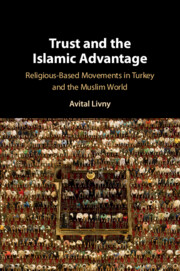Book contents
- Frontmatter
- Dedication
- Contents
- List of Figures
- List of Tables
- Acknowledgments
- 1 Introduction
- Part I Theoretical Development
- 2 Understanding the Rise of Islamic-Based Movements in the Muslim World
- 3 Evaluating Existing Theories of the Islamic Advantage
- 4 Generalized Distrust and the Participation Gap in the Muslim World
- 5 Muslim Identity and Group-Based Trust
- Part II Applications and Empirics
- Part III Theoretical Development
- Appendix
- Bibliography
- Index
3 - Evaluating Existing Theories of the Islamic Advantage
from Part I - Theoretical Development
Published online by Cambridge University Press: 31 August 2020
- Frontmatter
- Dedication
- Contents
- List of Figures
- List of Tables
- Acknowledgments
- 1 Introduction
- Part I Theoretical Development
- 2 Understanding the Rise of Islamic-Based Movements in the Muslim World
- 3 Evaluating Existing Theories of the Islamic Advantage
- 4 Generalized Distrust and the Participation Gap in the Muslim World
- 5 Muslim Identity and Group-Based Trust
- Part II Applications and Empirics
- Part III Theoretical Development
- Appendix
- Bibliography
- Index
Summary
Observable implications ofthree existing theories of the Islamic advantage -- grievances, faith, information -- are tested using a variety of data sources. Contrary to the expectations of grievance theory, individuals in the Muslim world appear to be more dissatisfied and less apathetic. Moreover, participation rates are lowest among the most aggrieved, much as they are elsewhere in the world. In contrast to what the faith-based theory expects, participation rates are significantly lower among individuals with the strongest religious beliefs. Further, the popularity of Islamic-based political and economic movements does not appear to follow trends in religiosity in the aggregate, neither across space nor across time. Instead, support for these movements appears to come from both the religious and the secular, in Turkey and across the Muslim world. Finally, there is little evidence that voters in Muslim countries are uninformed, generally, or better informed about Islamic-based parties, in particular. The lack of support for the all three existing theories reopens the puzzle of Islamic-based movements yet again.
Keywords
- Type
- Chapter
- Information
- Trust and the Islamic AdvantageReligious-Based Movements in Turkey and the Muslim World, pp. 37 - 64Publisher: Cambridge University PressPrint publication year: 2020



